If you want to raise chickens successfully, you have to choose breeds suited to your purposes and the environment’s climate in which you’ll raise them. You shouldn’t just buy a breed because it’s the latest in the poultry world or because your neighbor spoke highly of it.
What are your plans for the chickens? If you intend to get as many eggs as possible from the chicken, egg-laying chicken breeds are your best option. Also, if your region is hot, you should go for heat-tolerant chickens.
Ensure the chicken breed is healthy as well. The Delaware Chicken has been touted to be a healthy and productive chicken but read more information about it below to see if it’s an excellent addition to your flock.
This article will cover
- How Did The Delaware Chicken Come To Be?
- Delaware Chicken: Breed Standard And Appearance
- What To Know About The Personality Of The Delaware Chicken
- How High Is The Delawares’ Egg-laying Rate?
- Are The Delaware Chickens Healthy?
- 4 Tips For Raising The Delaware Chicken
How Did The Delaware Chicken Come To Be?
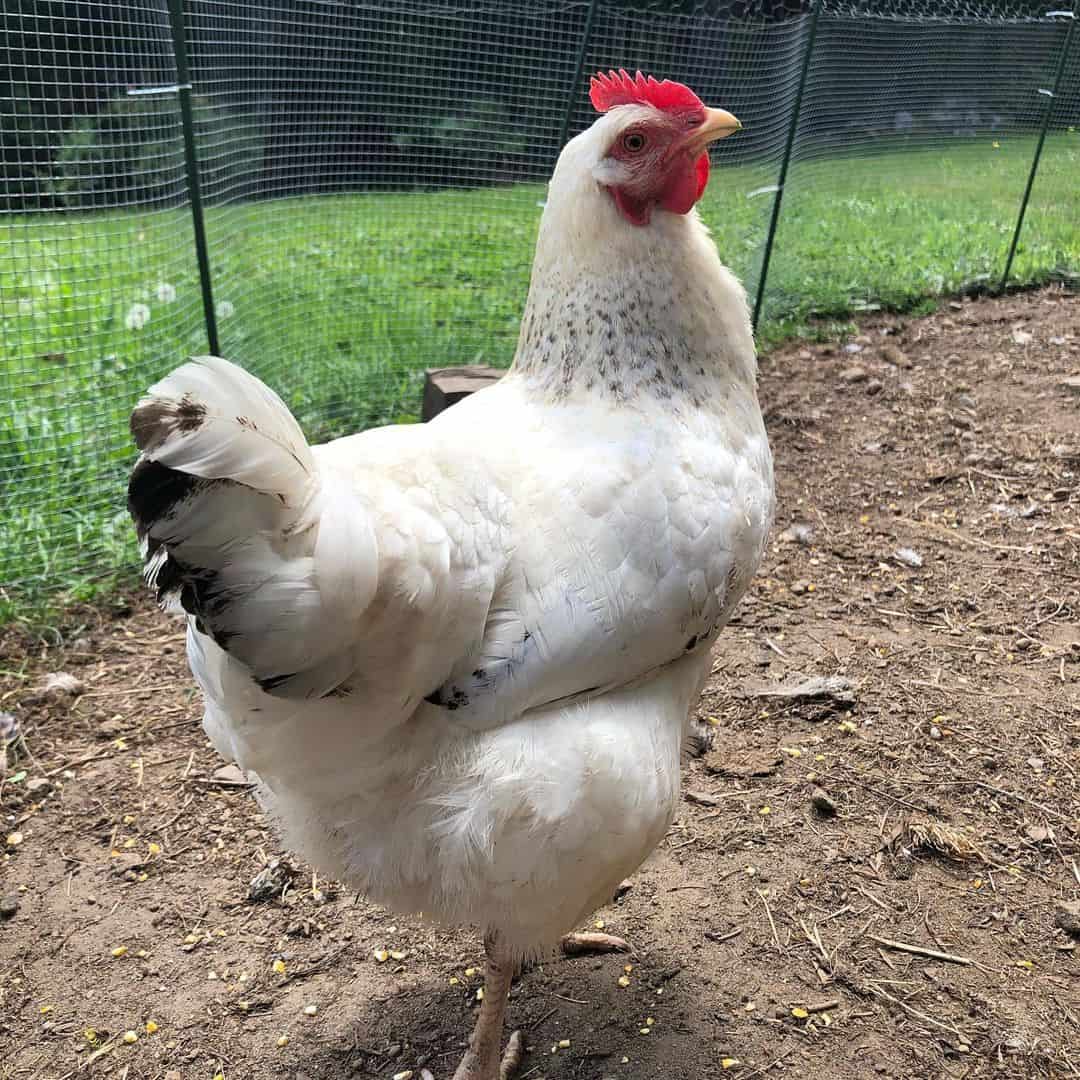
Initially referred to as the Indian River Chicken, the Delaware chicken breed was created from crossing Plymouth Rock with New Hampshire. However, it had some flaws. In Delaware in the United States, Mr. George Ellis decided to refine this breed and renamed it, Delaware.
This program happened in the 1940s, and ever since then, the Delaware chicken has been known in the poultry world. The American Poultry Association Standard of Perfection recognized this breed in 1952.
Even though it isn’t precisely documented why Mr. Ellis worked to refine this chicken breed, studies show that he did that to increase the number of broilers in his hatchery. However, the breed became popular in farms and hatcheries that dealt with broilers for quite some time until the Cornish Cross came into existence.
As a result, Delawares began to wane in popularity while the Cornish Cross took over the poultry industry. However, some enthusiasts started raising the Delaware chicken again years ago because it is a dual-purpose chicken.
It is fleshy but also produces healthy eggs. The hens weigh about 6 pounds, while the roosters weigh 8 pounds. Among the chicken breeds with quick maturing rates, the Delaware chicken stands out. Sometimes, they are crossed with breeds such as Rhode Island Reds to produce sexed chicks.
Delaware Chicken: Breed Standard And Appearance
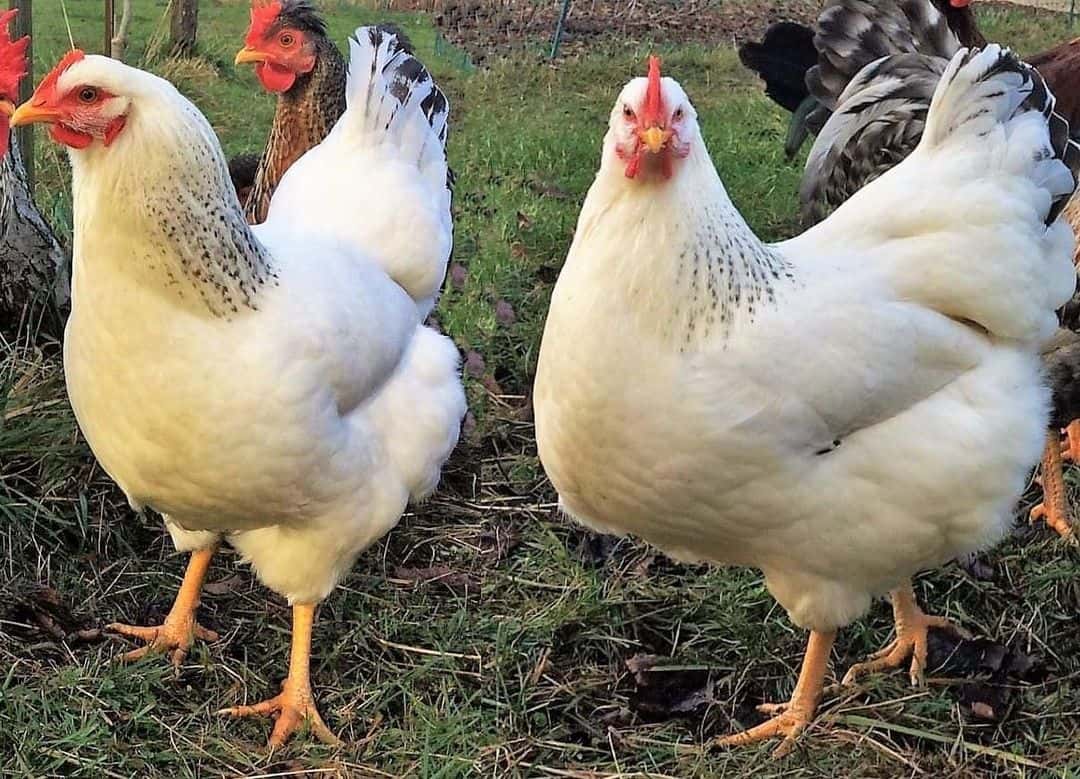
Delawares have bantam sizes too: the hens weigh 1.75 pounds, while the roosters weigh 2 pounds. In addition, they are famed for their strength and health. Hardly will you find a naturally weak Delaware chicken. They don’t require many resources to maintain, too; you just have to ensure you provide the essential things for them.
With adequate care and maintenance, they can live for more than five years. However, ensure you regularly inspect every part of their bodies to prevent parasites from gaining entrance. With a medium-sized body and black-barred tail feathers, the Delaware chicken is typically white-skinned and white-feathered. However, the plumage near their neck has black spots.
The cocks have red combs, earlobes, and wattles with yellow beaks. You might be tempted to think that Delawares are robust when you look at their front view, but a closer inspection will reveal that they are inverted to form a U shape instead. Also, their legs are muscular; it’s unusual to find a Delaware with skinny legs.
However, they aren’t to be compared with Columbian chickens. Columbian chickens have a solid black color, while only some parts of Delaware are barred black. Aside from the solid white varieties, there are no other varieties of Delaware chicken.
What To Know About The Personality Of The Delaware Chicken
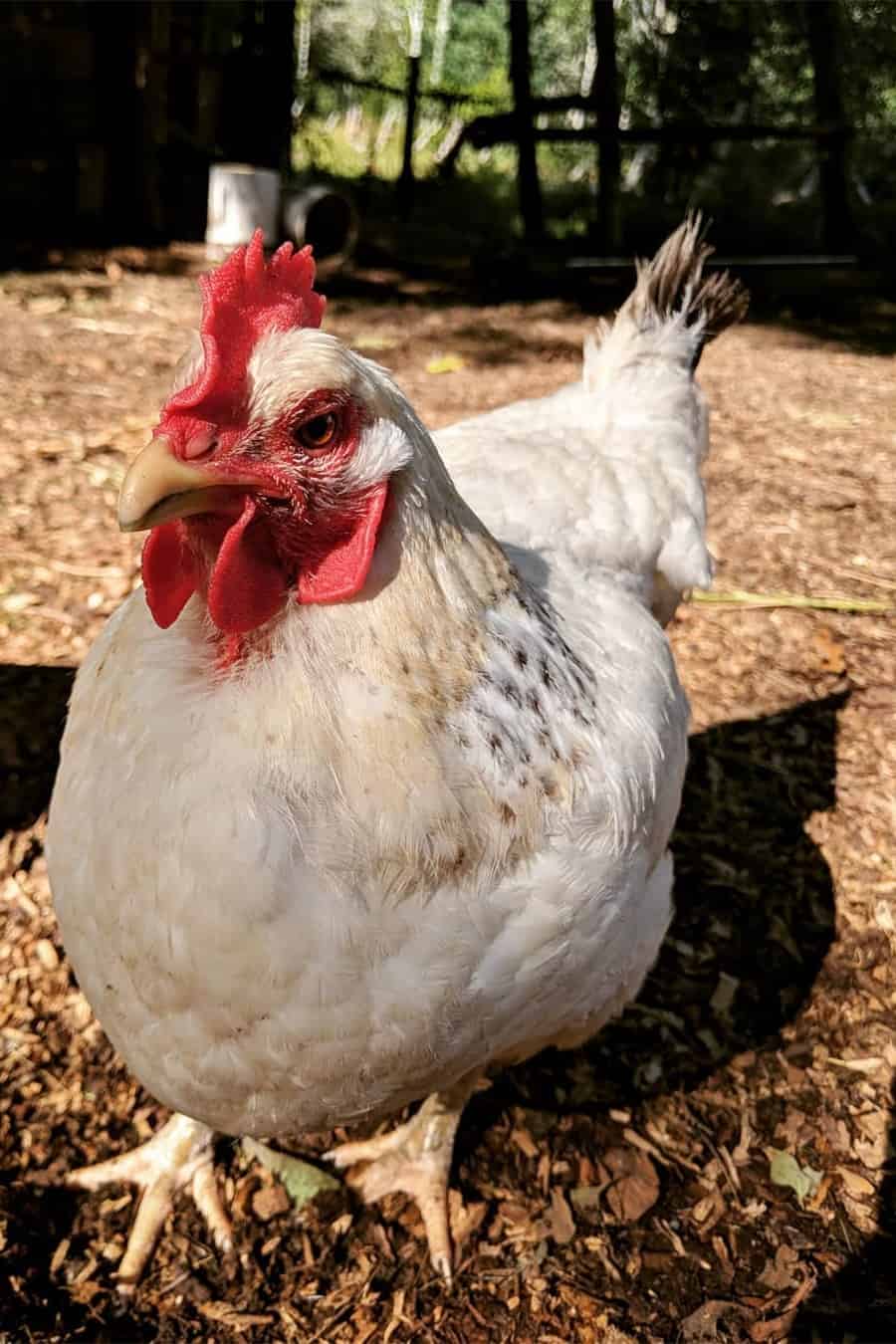
Delawares are one of the friendliest chicken breeds, they are suitable for children’s company. You won’t find them behaving aggressively, they maintain their gentle disposition always. Besides, they are often the life of the flock.
You’ll find them chattering if they aren’t free-ranging or eating; you wouldn’t want to leave their company if you get close to them. However, their gentleness doesn’t mean they can be pushed over or walked upon; they are assertive when needed but not to the extent of being a terror to other birds. They are always at the highest level of the pecking order.
Another thing to note about your Delawares is that they are very inquisitive and love to free-range. As such, you can’t shut them up in a small space and expect them to be comfortable. You’ll find them in places they shouldn’t be or rummage through things they shouldn’t touch.
Therefore, you have to keep away harmful materials or substances from your environment. However, they’re always on the lookout for predators, even when free-ranging. You can rest assured no harm will come to them as long as their environment is safe. Also, bear in mind that not every Delaware will enjoy your company the same way.
How High Is The Delawares’ Egg-laying Rate?
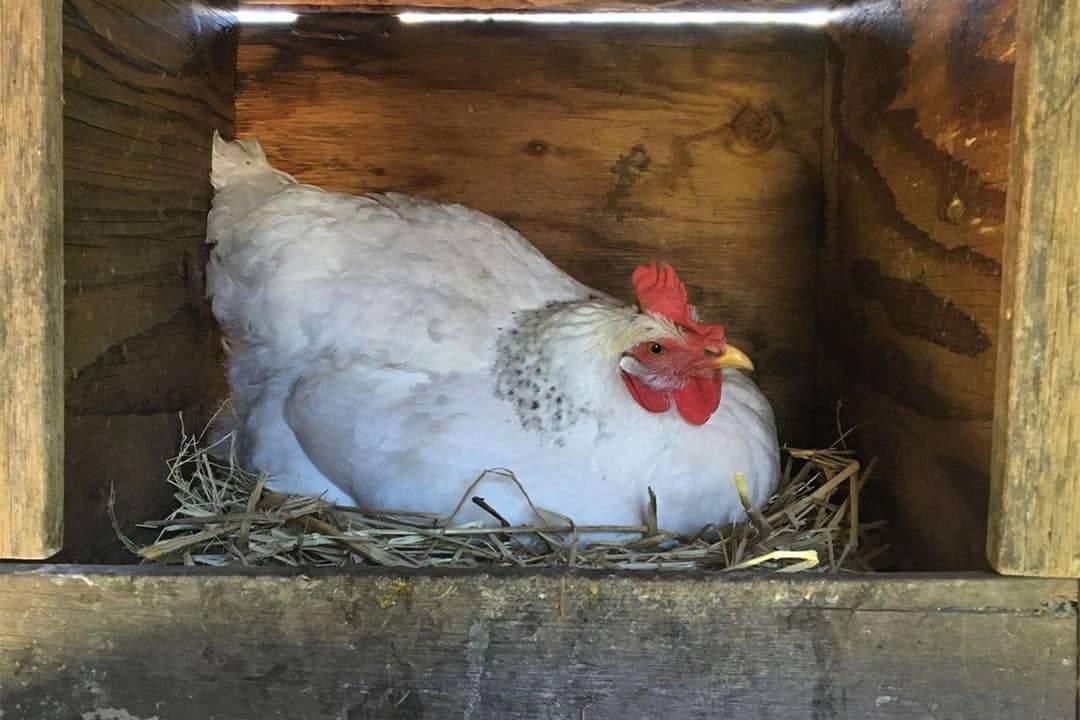
As a dual-purpose bird, the Delaware chicken is very prolific at laying eggs. Their eggs are usually large-sized and light brown. Sometimes, you can get dark brown eggs. Under the right conditions, each hen lays about 4 eggs per week, at least 200 eggs a year. However, they rarely brood. An incubator is your best bet if you want to hatch the eggs produced by Delaware.
This chicken breed starts laying eggs around six months, but eggs reduce by 10% annually as they grow older. Since Delawares can live up to 6 or 7 years old, you’ll get a pretty massive number of large eggs from them.
However, other things also influence their egg production. For instance, their feed must contain the necessary nutrients so that they’ll be able to lay healthy eggs, which will reduce the chances of the hens eating their eggs. If their feed lacks calcium, the eggs don’t have strong shells.
As such, a hen can easily break or eat them. Also, their environment must be safe enough to enhance their well-being. For example, chickens benefit from at least 15 hours of light per day for optimal egg production. Inadequate light equals health issues and reduced egg quality.
Are The Delaware Chickens Healthy?
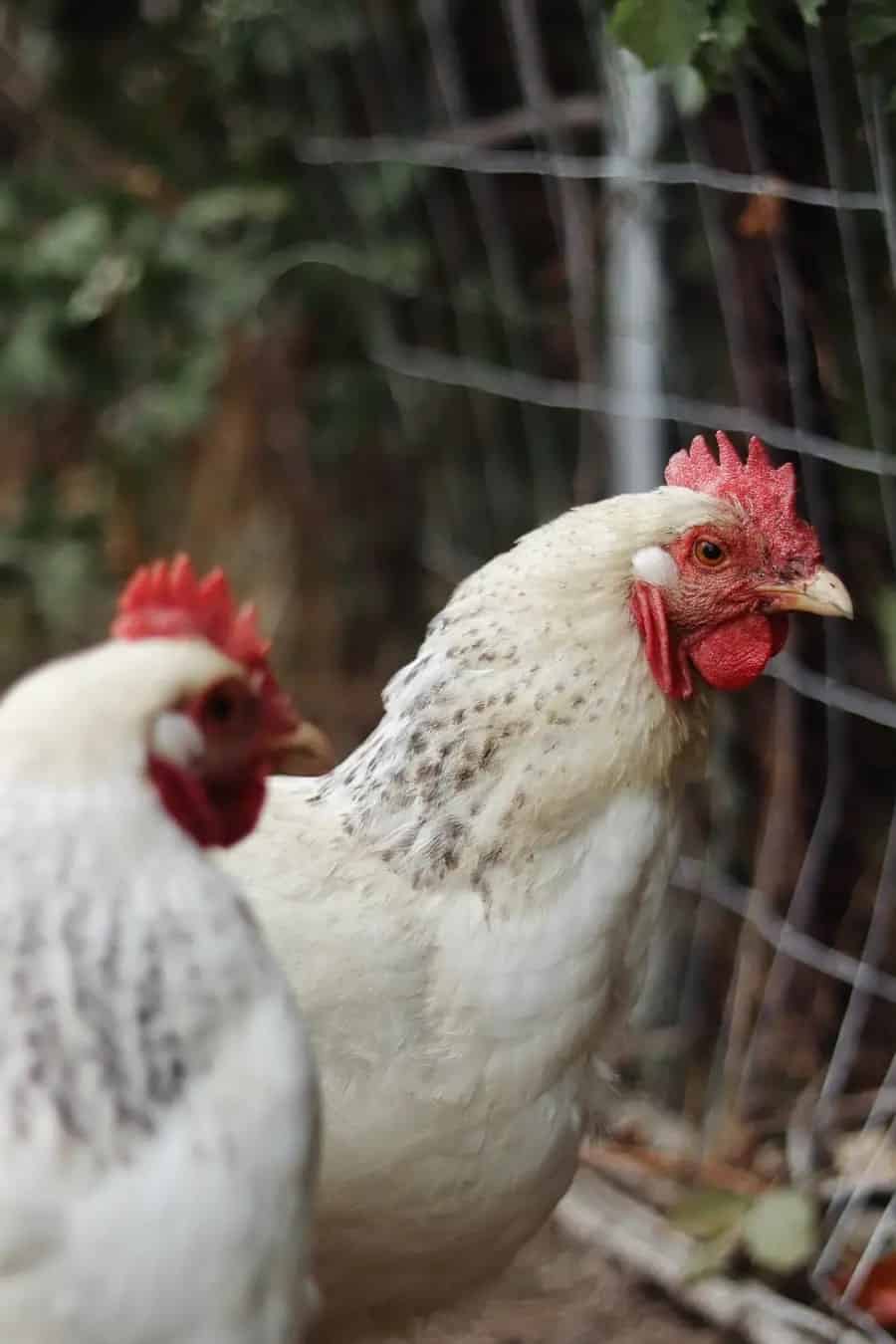
You can’t have much trouble raising the Delaware chicken; they are usually healthy and strong. But just like other chicken breeds, you have to keep them in a clean environment. Chickens don’t do well in dirty places as their health is susceptible.
Besides, dirty environments breed both internal and external parasites. Ensure you inspect the chickens regularly, especially in hidden areas for signs of ticks, mites, etc. Use the appropriate solution to treat infected cases. You can subject your flock to periodic veterinary tests to help combat any internal health issues they might have.
As regards care, Delawares should be fed with the required amount of feed of good quality. However, the chicks’ diets are quite different from the chickens’ diets. For example, chicks need about 24% of the protein in their diet for the first eight weeks of their lives.
Food and water must be available all through the day as this chicken breed matures fast. However, don’t overfeed your chicks to avoid diarrhea. Feed them with little quantity multiple times during the day.
You should also add foods that enhance eggshells, such as shell grit, etc., to chicks’ and chickens’ diets. Don’t mix the grit with their feed; instead, put it in a separate container for your flock.
4 Tips For Raising The Delaware Chicken
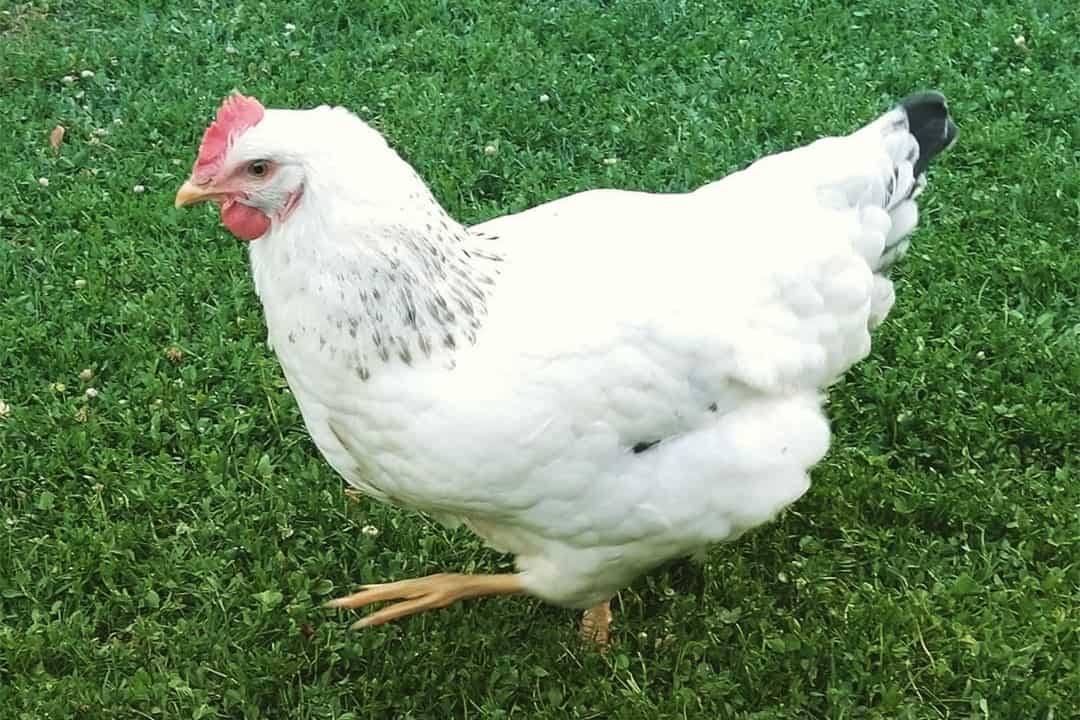
Besides their strength and good health, Delawares are low-maintenance birds. They are neither picky nor demanding. Below is a guide on how to raise them.
Housing
You need to put your chickens in a good house. Naturally, Delawares are curious with a strong love for free-ranging. You’ll rarely find any of them sitting or standing still except it is sick, eating, or catching their breath.
Therefore, their coop or run must be devoid of dangerous materials. They’ll certainly find whatever you keep in their environment. Also, provide them with enough space.
Each chicken should have at least ten square feet of personal space. Don’t keep them all cramped up in a small space to avoid unnecessary fights and cannibalism. Allow them to forage; they get some of their food from these activities sometimes.
Natural growth and care
Don’t try to complicate the process of raising your chickens by incorporating chemical solutions when it’s not necessary. For instance, allow them to free-range so that they can eat more natural foods.
Use homemade remedies to treat uncomplicated infections or clean their house. Allow them to grow naturally to the point of laying. You can also repurpose some house equipment into handy tools for your chicken care. This not only saves cost but also ensures your chickens aren’t in harm’s way.
Have a routine
To get the best out of your Delaware chickens, have a routine for them. Without one, you might not pay adequate attention to them, and this will affect their growth. Besides, it also helps stabilize your relationship with the flock while leaving you with enough time to sort out other issues.
Flock addition
If you’re adding the Delawares to other chickens, you have to ensure the personality of the breed you’re adding to the flock isn’t antagonistic. Since Delawares are friendly and gentle, don’t mix them with violent and aggressive species. Instead, look for friendly chickens.
Summary
By all appearances, the Delaware chicken makes a good breed for both egg and meat production. Since they are low-maintenance birds and mature quickly, you won’t have to spend much on them before you start seeing results.
However, it’s essential you know how to distinguish the Delaware chicken from other similar birds. One surefire way to do this is to buy from reliable hatcheries or local farmers.
Finally, even though Delawares are strong birds, don’t jeopardize their well-being by falling short of poultry standards. Basic things such as a clean environment, adequate food, water, constant light and ventilation, space, etc., must be observed. This way, you’ll enjoy raising Delawares in your backyard.


Joseph Hudson has been raising chickens for over 15 years. In 2018, he completed the Agriculture & Natural Resources program at Mt. San Antonio College. He currently raises over 1400 chickens on his 7.5-hectare farm. He keeps sharing his experience on raising healthy and happy chickens on Chicken Scratch The Foundry.








We live in Powell Tennessee, on two plus acres. We recently lost all of our laying hens. I want to replace them by purchasing 6 to 10 laying hens. My phone number is 865-945-4350. Please contact me if you have any for sale. I would prefer the Delaware Breed or a similar breed of laying hens. Thank you for responding, Allen Boyle